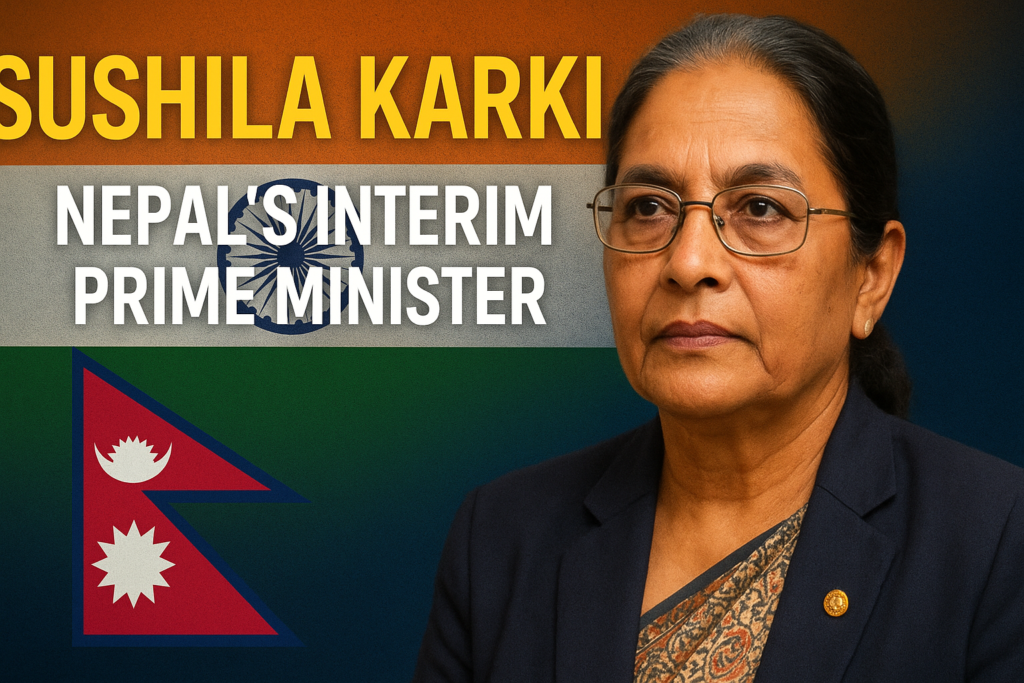Discover the incredible path of Nepal’s interim Prime Minister, Sushila Karki. From her studies at BHU in India to her struggle against corruption, here’s how her tale has influenced Nepal-India ties.
Introduction
Nepal is no stranger to political upheaval. Over the decades, the Himalayan nation has seen governments rise and fall, coalitions fracture, and leaders strive to strike a balance between democracy and stability. In this context, the country has turned to Sushila Karki, who has been named as interim Prime Minister.
Karki’s appointment is historic—she is the first woman to hold the position, although temporarily. However, her tale is not restricted to gender milestones. It is a story of intellectual excellence, legal authority, moral purity, and strong ties to India. To many, she represents a unique combination of personal courage and professional honesty.
Early Life and Education: From Biratnagar to Varanasi
A Student of Political Science
Sushila Karki was born on June 7, 1952, in Biratnagar, Nepal, and was drawn to academics from an early age. After finishing school in Nepal, she decided to further her studies in India, a decision that would change her perspective.
In 1975, she received her Master’s degree in Political Science from Banaras Hindu University (BHU) in Varanasi. Those years were critical, both intellectually and culturally. Living in India introduced her to democratic debates, cultural exchanges, and intellectual discussions that enlarged her horizons.
A Friend of India

Karki has constantly acknowledged the impact of her time in Varanasi. She considers herself “a friend of India” and values the values she learned at BHU. She has also talked highly of Indian leaders, particularly Prime Minister Narendra Modi.
This long-standing relationship with India is regarded as crucial, particularly given the delicate and frequently difficult relationship between the two neighboring countries.
Academic and Legal Career
From Professor to Advocate
Karki returned to Nepal and began her work as a Political Science lecturer at a college in Biratnagar. However, her desire drove her to pursue a career in law. She earned a law degree from Tribhuvan University in 1978 and began working in the legal field shortly after.
By 1979, she was practicing law. Her acute intelligence and unwavering integrity rapidly gained her recognition. In 2007, she was named a Senior Advocate, a significant accomplishment in Nepal’s legal profession.
Supreme Court Journey
Karki’s biggest break occurred in 2010, when she was appointed as a judge on Nepal’s Supreme Court. She went on to serve as Acting Chief Justice in 2016, before becoming the country’s Chief Justice in 2017.
Throughout her judicial career, she was noted for her groundbreaking decisions against corruption. She passionately supported judicial independence and frequently clashed with political individuals who sought to undermine it.
For many citizens, she became a symbol of honesty and fairness, which are uncommon in Nepal’s severely contested political scene.
Personal Life: A Story of Drama and Rebellion
Marriage to Durga Prasad Subedi
Sushila Karki’s personal life has been equally spectacular as her professional career. She is married to Durga Prasad Subedi, who was noted for his political activities in the 1970s.
Nepal’s First Aircraft Hijacking
Subedi and two companions were responsible for Nepal’s first aircraft hijacking in 1973. The Royal Nepal Airlines flight, which also carried Bollywood actress Mala Sinha, was forced to land in Forbesganj, Bihar.
The hijackers stole bundles of cash believed to belong to a bank and fled into the woods. Subedi eventually hid in Varanasi, but during India’s Emergency (1975–77), he was captured and imprisoned for two years before being handed over to Nepalese authorities.
This episode provided an interesting twist to Karki’s personal story, as she married a guy who formerly revolted against the monarchy using unconventional tactics.
Reputation of Integrity and Fairness
The BHU Connection Remembered
Professor Dipak Malik, a retired BHU faculty member, remembers Karki with fondness. He characterizes her as a serious student who is politically impartial and has strong principles. He also emphasizes her profound and lasting link with India, which is still relevant today.
Fighting Against Corruption
Karki’s court decisions garnered her both supporters and detractors. She was brave in confronting corrupt authorities, regardless of their political connections. For Nepalese citizens weary of scandals and mismanagement, this established her as a trustworthy leader.
Why Her Appointment Matters Today
A Friend of India at a Critical Time
India and Nepal have a delicate relationship, with open borders, cultural ties, and regular political disagreements. Having a leader who understands India well and has lived there as a student is a diplomatic plus. Karki’s designation as “a friend of India” is not purely symbolic.
It could aid in the development of confidence, the resolution of bilateral issues, and the maintenance of stability throughout Nepal’s transitional period.
Nepal’s Political Challenges
However, her path is not easy. Nepal is facing:
Political instability with fractured coalitions
Public unrest due to corruption and unemployment
Economic challenges in trade and infrastructure
Regional pressures between India and China
As interim Prime Minister, Karki must navigate these challenges with limited time and power. While her credibility is high, her authority is temporary.
The Road Ahead
Karki’s appointment provides Nepal with a small window of hope. She embodies neutrality, impartiality, and a people-first approach. She is a reassuring presence in India, understanding the cultural and political intricacies of both countries.
Interim governments, however, are inherently shaky. The true test is how well she can stabilize Nepal, prepare for elections, and preserve trust across political lines.
Conclusion
Sushila Karki’s journey is exceptional. Her life has been marked by resilience, fortitude, and integrity, from her days as a student at BHU in Varanasi until her appointment as Nepal’s first female interim Prime Minister. Her legal career exemplifies a brave fight against corruption, and her personal experience adds layers of drama and depth.
As Nepal stands at a crossroads, Karki bears the duty of guiding the country through uncertainty. Whether her stay is brief or long-term, one thing is certain: she represents a rare combination of honesty, intellect, and cross-border goodwill that South Asian politics sorely requires.
